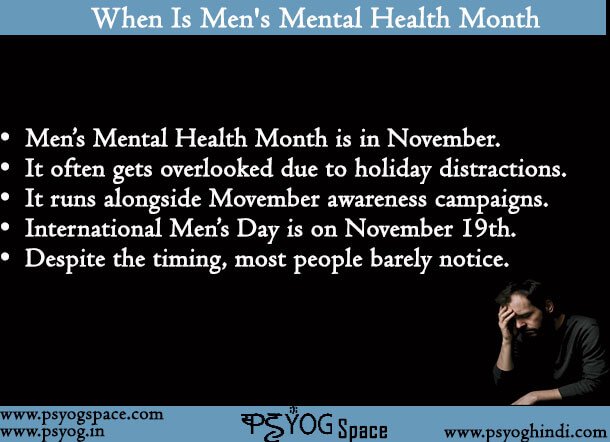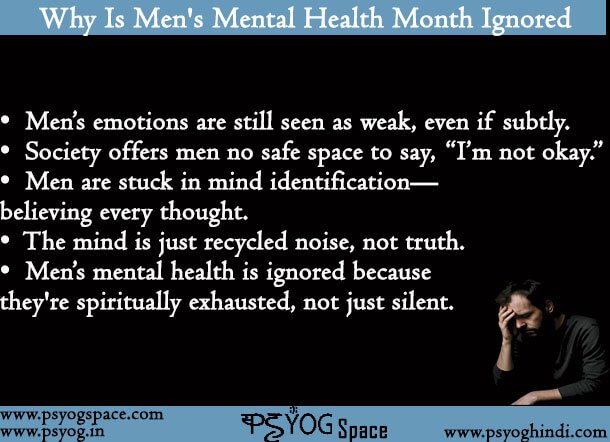Men’s Mental Health Month: When Is It, Why Is It Ignored & More
So, there’s this thing called men’s mental health month. Bet you didn’t hear about it. Most don’t. It kind of just exists—in the background—quiet, overlooked, ignored. You might wonder, when is it, or honestly, why is it ignored? The bigger truth? Men are falling apart. Not always loudly. Sometimes they still show up, shave, smile. But inside? They’re unraveling.
And here’s the kicker—we’ve taught them to hide it. “Don’t feel too much. Don’t say too much. Just handle it.” That’s the unspoken rule for being a man. But no one’s really handling it. They’re just carrying it. Quietly. Painfully. Alone. That’s why men’s mental health month even matters. Not for awareness alone—but for the kind of truth that doesn’t usually make it into headlines or hashtags.
When Is Men's Mental Health Month
Let’s get this part out of the way first. When is men’s mental health month?
It’s in November. Which feels odd, doesn’t it? It slips in while we’re all busy prepping for holidays, scrolling through Black Friday deals, maybe complaining about the cold. But it’s there. Tucked under the surface.
Ever heard of Movember? That’s the thing where guys grow mustaches to raise awareness for prostate cancer and mental health. Yeah—men’s mental health month rides alongside that. And then there’s International Men’s Day on November 19th. Again, you’d barely know.
So if you’re still wondering when is it, now you know: November. But knowing the date doesn’t mean people care. That part… gets trickier.
Also Read:

Why Is Men's Mental Health Month Ignored
This part hits deep. Because, honestly, why is men’s mental health month ignored?
We’ve built a culture where a man showing emotion is still seen as weak. Not openly, maybe. But it’s in the subtext. In the awkward silences when a guy says he’s depressed. In the “you’ll be fine” replies. In the absence of space for men to actually say, “I’m not okay,” and be met with anything other than discomfort.
And then there’s this deeper thing we don’t talk about. Like women, men are also trapped in something bigger than just stress or pressure. They’re trapped in the mind. Or more accurately—mind identification. That’s when you don’t just think—you become your thoughts. You start believing every voice in your head. Every fear, every judgment, every loop.
And guess what the mind is? Just recycled content. Thoughts. Info. Trauma. Memory. It’s not truth—it’s just noise. But when you think you are it, when that becomes identity? Mental chaos follows. Men’s mental health month was supposed to create space for this conversation, but instead, we’re stuck saying, “Men should speak up more,” without ever asking why they don’t feel safe doing that.
Why is it ignored? Because we’ve ignored the root: men aren’t just emotionally shut down. They’re spiritually exhausted. They don’t even know they’ve become prisoners of their thoughts.
You dis-identify from the mind? That’s where healing starts. That’s where clarity lives.
But yeah, that’s not trending right now.

Conclusion
Here’s the part we’re meant to wrap up with a bow, but maybe don’t. Just let it land heavy for a second.
Men’s mental health month happens in November—so now you know when is it. And maybe you understand why is it ignored: because most people still think vulnerability and manhood don’t go together. And even deeper than that? Because we’re all too tangled in our minds to see the truth.
But there’s something else. The moment a man steps back from his thoughts and says, “This isn’t me. This isn’t who I am,” something shifts. He stops being a product of pain and starts becoming a witness. That’s where the real work begins. And it’s not just for men. It’s for all of us.
Health:
FAQs
Yeah. There is. Men’s mental health month happens every year in November, though no one really talks about it. It’s part of a broader effort to raise awareness around things like suicide, depression, anxiety, and emotional repression among men. The Movember campaign and International Men’s Day (November 19) fall under this month. It’s supposed to be a time to start the conversations most men are afraid to have. Whether it’s working or not? That’s still up for debate.
Because men are dying quietly. That’s the short version. The stats on male suicide are terrifying. But even beyond that, the day-to-day suffering—burnout, emotional numbness, loneliness—eats away at men’s lives. When men don’t feel safe expressing pain, they bury it. And buried pain turns into addiction, aggression, detachment, isolation. Men’s mental health isn’t just about fixing a problem—it’s about reclaiming something human. Something tender. Something that was never supposed to be shameful in the first place.

